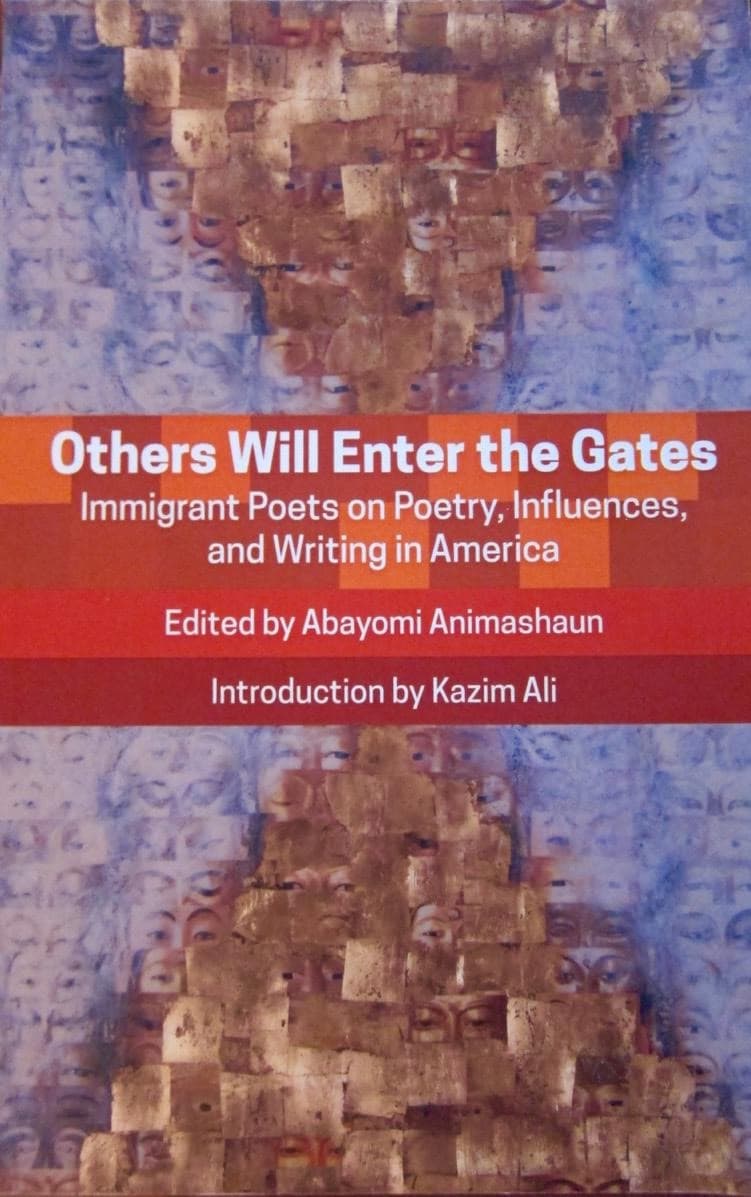Others Will Enter the Gates: Immigrant Poets on Poetry, Influences, and Writing in America
(“Migrant” is the essay-poem by Marilène Phipps contributed here. See writing sample in Poetry section).
No two immigrant poets are the same. Even those from the same country don’t necessarily answer to the same poetics or, for that matter, speak to the same concerns. How, then, do immigrant poets in America define themselves? How do they see and position themselves within the landscape of American poetry or the poetic traditions of their own country? Who might they consider their influences? Answers to these questions are complex, individual, and varied, as seen with the essays included in this anthology.
Contributors: Zubair Ahmed, Kazim Ali, Abayomi Animashaun, Lisa Birman, Ewa Chrusciel, Kwame Dawes, Michael Dumanis, Megan Fernandes, Cristian Flores Garcia, Danielle Legros Georges, Rigoberto Gonzalez, Maria Victoria A. Grageda-Smith, Andrei Guruianu, Piotr Gwiazda, Fady Joudah, Pauline Kaldas, Ilya Kaminsky, Vandana Khanna, Jee Leong Koh, Vasyl Makhno, Gerardo Pacheco Matus, David McLoghlin, Majid Naficy, Marilene Phipps- Kettlewell, Shabnam Piryaei, Barbara Jane Reyes, Jose Antonio Rodriguez, Matthew Shenoda, Sun Yung Shin, Anis Shivani, Ocean Vuong, and Sholeh Volpe.
“Nerval once said that you ought to travel so much that even your home becomes strange to you, but I have no hope other than the opposite that is to say: once you cross borders often enough you find really that every place must be somehow home. The poets collected here testify, both in these statements and in their own work, that such a home is possible.”
Kazim Ali, from the Introduction “The range of voices and the experiences those voices represent in OTHERS WILL ENTER THE GATES: IMMIGRANT POETS ON POETRY, INFLUENCES, AND WRITING IN AMERICA provide the reader with an entrance into other worlds and other ways of seeing and walking in those worlds. Our notions of identity, of transition and transformation, of the translation of language and culture, of the very idea of documenting who or what a person fundamentally is, are called into question by these probing and provocative essays. This is a striking and essential collection, one in which the reader vicariously becomes an immigrant of sorts, allowed to pass over personal and national borders, ferried along by the beautiful and vital prose of some of the finest poets working in the U.S. today.”
Todd Davis “OTHERS WILL ENTER THE GATES is a timely and necessary collection and to say that it is thought- provoking and versatile is an understatement. I urge everyone who cares about and loves the exiled and immigrant voices that constantly provide the new blood that keeps contemporary American Poetry lively and exciting to read and share this book, and to the teachers I say please don’t miss out on this great opportunity to use this wonderful collection in your courses.”
Virgil Suarez “Each time I open this book, each time I follow one of these fine poets through another gate in this country of a thousand gates, I feel like an immigrant again, realigned with my own Huguenot ancestors fleeing the religious tyrannies of France three centuries ago. To read these essays is to have your faith in the poetic future of this land restored, over and over again.”
David Shumate “OTHERS WILL ENTER THE GATES is a multilayered exploration by writers of different generations and backgrounds that passionately offers an urgent and daring insight into America’s ever-expanding literature on the immigrant experience…”
Dike Okoro “The great irony and most fabulous beauty of this very real and readable collection of essays are testament to why poetry has lasted for tens of thousands of years. No matter one’s circumstance, it’s outlived everything every economic theory, every political ideology. Poetry exists because it is the language for which we have no language. What do we do when we can’t explain profound and genuine grief? What do we do when we can’t articulate profound and genuine joy? These poets, like all poets, make poems.” Ralph Angel”

